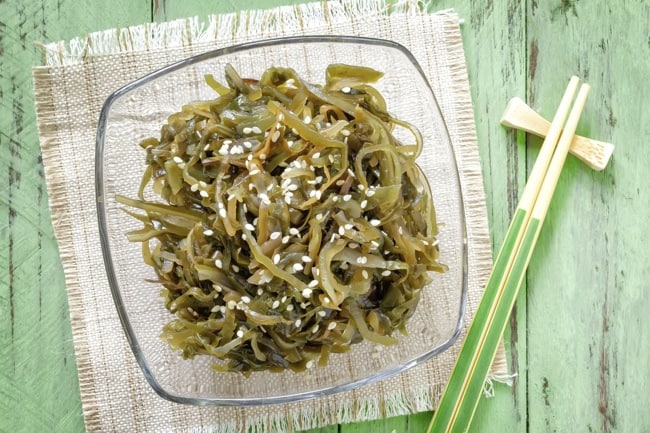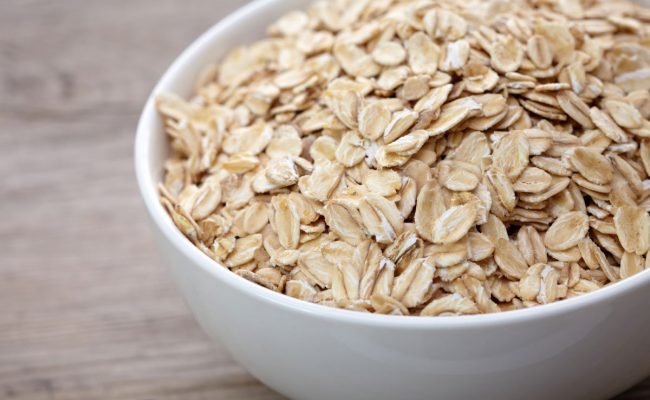
Brown seaweed is a type of algae that grows mainly in the waters of the Northern Hemisphere. It is quite rare to use seaweed in most Western diets, but seaweed is commonly used in Asian culture.
You can eat brown seaweed various ways: raw, pickled, dried or cooked. Like other forms of seaweed, it can commonly be used in salads or in soups.
Brown seaweed like other sea vegetables are high in trace minerals, fiber, antioxidants and can provide a slight salty flavor.
Research is on going with brown seaweed and how it may benefit health, and so far research studies suggest there may be many reasons brown seaweed is good for you.
For example, a 2014 review (1) suggests seaweed may have an important role in impacting chronic disease risk.
Seaweed has unique compounds in them that aren’t found in other land vegetables. Some cell and animal studies have suggested seaweed may have anti-cancer, anti-viral, anti-coagulant and obesity fighting properties.
More human studies are needed, but so far research suggests brown seaweed may have many potential health benefits.
Nutrition of brown seaweed
Like other vegetables, brown seaweed is very low in calories yet high in nutrients. Brown seaweed is a source of: iron, magnesium, B vitamins and fiber.
Seaweed is also a rich source of the mineral iodine. Iodine is mainly consumed from salt that has been fortified with iodine.
Iodine is needed for the body to convert food into energy and for thyroid function (2).
An ounce of raw seaweed is less than 15 calories and provides 4% DV calcium, 3 % DV iron, 2% DV vitamin A and 1% DV vitamin C.
Antioxidant source
Brown seaweed is a source of antioxidants that could potentially be used as natural antioxidants in the food industry (3).
A 2007 study (4) found extracts of brown seaweed showed antioxidant activity. Consuming a diet high in foods high in antioxidants, like fruits and vegetables, is encouraged by health professionals.
Antioxidants from food may help protect cells from damage from damage or from carcinogens.
Eating a variety of fruits, vegetables, whole grains, legumes, nuts and seeds is recommended for optimal antioxidant intake because no single food contains all antioxidants.
Adding brown seaweed to your diet may add additional antioxidants to your diet, but incorporating a variety of vegetables is recommended.
Brown seaweed and breast cancer risk
Brown seaweed is commonly consumed in Japan. Japan also has a low rate of breast cancer.
Epidemiological studies suggest there may be an association between brown seaweed intake and lowered risk for breast cancer.
More research is needed on seaweed and cancer risk, but there may be some potential ways brown seaweed may positively affect cancer risk (5).
Brown seaweed is a good source of fiber which can help increase fecal bulk and lower time food spends in the colon.
Brown seaweed may also contain an antibiotic component that may affect fecal matter.
In plain terms, eating a diet high in fiber, like from brown seaweed, may lower the absorption of potential carcinogens into the digestive system.
There are many factors affecting cancer risk, so research is ongoing for dietary factors that influence cancer risk.
Researchers still are not completely sure for the association between brown seaweed and lowered risk for breast cancer in Asian cultures. It may be a combination of dietary, lifestyle and genetic factors.
Prebiotic source
Prebiotics are considered non-digestible fibers that can help promote the growth of beneficial bacteria (probiotics) in the gut.
Even though we can’t digest these fibers, they act as food for healthy bacteria in our digestive tract.
Therefore, consuming prebiotics can help promote the growth of probiotics.
The bacteria in the digestive tract influences health in many ways, and research is ongoing for continuing to understand how the bacteria in our gut affect our overall health.
Eating a diet that provides both pre and probiotics is recommended.
Brown seaweed is considered a prebiotic source (6). Animal studies have shown adding seaweed to their feed can act as a means to add prebiotic source in their diet.
Besides seaweed, other foods that can be considered prebiotics include: bananas, onions, garlic, asparagus, artichokes and soybeans.
Fight obesity
According to Science Daily (7), Japanese chemists have found that components in brown seaweed may help promote weight loss by lowering the accumulation of fat.
Their research was done in animals, so further research is needed in humans for brown seaweed’s affect on weight loss.
The specific compound in brown seaweed that may be responsible for its potential anti-weight property is called fucoxanthin.
According to researchers, animals given the fucoxanthin had 5-10% weight reduction in animals.
Unfortunately, in order to get the potential weight loss benefits from fucoxanthin, you would have to eat a lot of brown seaweed.
Researchers are doing further testing for human studies and recommended dosing for fucoxanthin.
If you are thinking about taking a supplement that contains seaweed or fucoxanthin, speak with your doctor first.
Are there any concerns for eating high amounts of brown seaweed?
According to drugs.com (8), there doesn’t appear to be any contraindications with eating seaweed.
However, if you are pregnant or breast feeding, there isn’t data for the safety of consuming seaweed, especially in high doses or in supplemental form.
If you are taking any blood clotting medication, like warfarin, use caution with adding seaweed to your diet.
Seaweed is high in vitamin K, like other green vegetables, and may interfere with medication.
Consuming too much seaweed may also be a concern for getting too much iodine. Getting too much iodine could cause hyperthyroidism.
Seaweed can also absorb potential toxins from its environment which could be translated to someone eating it.
For example, arsenic or cadmium are toxins that could be in seaweed that can negatively affect health.
The bottom line is seaweed should be enjoyed as part of a varied, well balanced diet.
It is a good source of antioxidants, minerals and provides some possible unique health benefits. However, it shouldn’t be eaten in excess.










